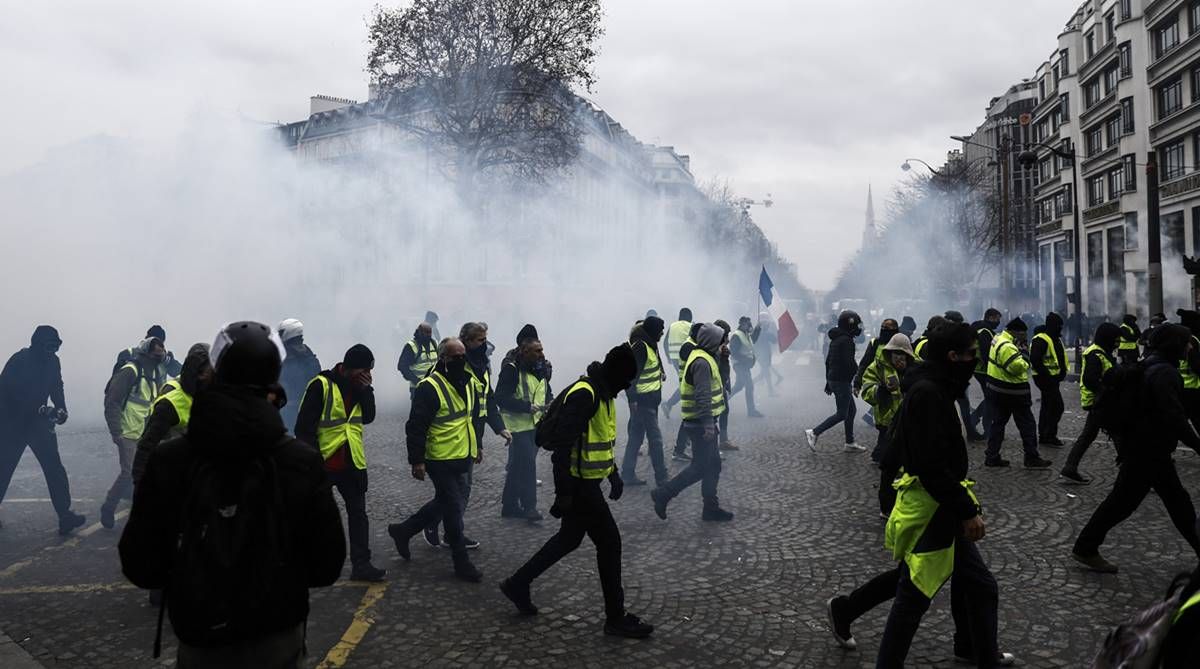Crisis Averted
The US Congress narrowly averted a government shutdown with the passage of a bipartisan funding bill, but the process laid bare the persistent challenges of governance in an era of heightened partisanship and external influences.
Accepting some responsibility for his role in the situation, he noted, “I may have given you the feeling I have other concerns and priorities. I know some of you have been hurt by my words.”

(Photo: AFP)
Following the fourth consecutive weekend of widespread and occasionally violent mass protests across France, President Emmanuel Macron was uncharacteristically contrite in an address to the nation on Monday, acknowledging that the anger on the streets was “deep and in many ways legitimate”.
He admitted there were “people whose status in society had not been sufficiently recognised,” adding, “in a cowardly way we had got used to it, and everything seemed to suggest that we had forgotten them.” Accepting some responsibility for his role in the situation, he noted, “I may have given you the feeling I have other concerns and priorities. I know some of you have been hurt by my words.”
Advertisement
Arrogance is a characteristic common to every Fifth Republic president, beginning with Charles de Gaulle (whom Macron reveres), which means self-criticism is a rarity. In his speech, the incumbent also vowed to use “all means” to restore calm, complained that the protesters threatened French liberty, and insisted there would be no U-turns.
Advertisement
The last of these claims is decidedly untruthful. There was clearly a U-turn last week when the government first temporarily postponed and then more or less indefinitely suspended the planned increase in fuel tax that provided the spark for last month’s gilets jaunes (yellow vests) mobilisations. That measure predictably failed to mollify the revolting multitudes, whose anger had long since morphed from a specific grievance into a more generalised rage against growing inequality.
On Monday, Macron announced another reversal by cancelling a planned tax increase for low-income pensioners, alongside a 100 euro increase in the monthly minimum wage from next month, plus a tax-free end-of-year bonus for all employees. At the same time, he declared that he would not reinstate a wealth tax that was rescinded some three decades after Francois Mitterrand introduced it.
He may change his mind on that, too, if the coming weekend brings more protests. Though the number of protesters has diminished somewhat since mid-November, the level of arrests, many of them pre-emptive, has spiralled upwards — and includes high school students complaining about curriculum changes. More significantly, the level of popular support for the protesters and their demands (some of which have now been accepted) remains high at 66 per cent, although it has dwindled by a few percentage points more recently.
The president’s popularity, meanwhile, has been in the low 20s, and one recent poll has it down to 18 per cent. In fact, it declined precipitously very soon after Macron was elected 18 months ago. He comfortably defeated his far right rival Marine Le Pen in the second round of last year’s presidential election, but only after attracting only about a quarter of the popular vote in the first round.
Macron offered himself as a refreshing alternative to the traditional parties of the left and right, but his agenda incorporated the same old neoliberal mantra of the mainstream parties dressed up in fancy new clothes and sprinkled, for good measure, with political inexperience. His triumph against Le Pen was reassuring, but there was never any serious prospect of this ex-banker addressing the key concerns behind the French electorate’s disenchantment with the traditional conservative and supposedly socialist parties. It didn’t take long for his reputation as a “president for the rich” to crystallise. And his panicked tinkering on the edge of his largely retrogressive reforms will do little to change that.
A supposedly green agenda has formed part of Macron’s aspirations to European and broader international leadership, and the fuel tax hike was hyped up as an environmental measure. But it threatened to disproportionately hurt those who live outside the main cities and rely on their vehicles to earn their living. All too many of them struggle to make ends meet, and cannot afford to switch to electric cars. Nor can they rely on public transport.
Not surprisingly, climate change denialists such as Donald Trump have latched on to France’s unrest as an example of why it’s futile to act against carbon pollution. They are gravely mistaken, and will no doubt continue to contribute towards making the world unliveable for future generations.
Where the Macron government has clearly erred is in assuming that a regressive tax that punishes the economically vulnerable segments of society is an acceptable means of mitigating global warming. As one of the protesters told Le Monde, “The elites are talking about the end of the world while we’re talking about the end of the month.”
The gilets jaunes have resisted the temptation to ally themselves with any party, and reports suggest that elements from both the far right and the far left were instrumental, on the fringes of the protests, in lighting fires and smashing shop fronts. But the momentum could go either way, and it’s far from clear exactly what lessons Macron has imbibed from this ongoing challenge to his misrule.
Dawn/ANN.
Advertisement